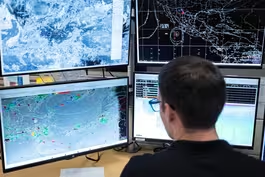
Study shows link between CT scans, risk of developing cancer
Clip: 6/1/2025 | 6m 12sVideo has Closed Captions
Study shows link between CT scans and the risk of developing cancer
CT scans are quick, painless, non-invasive tests that can identify everything from brain tumors to injuries from an accident. But a new study published in the journal JAMA Internal Medicine shows a link between the radiation exposure from the imaging tool and cancer. Ali Rogin spoke with Dr. Rebecca Smith-Bindman, the study's lead author, to learn more.
Problems playing video? | Closed Captioning Feedback
Problems playing video? | Closed Captioning Feedback
Major corporate funding for the PBS News Hour is provided by BDO, BNSF, Consumer Cellular, American Cruise Lines, and Raymond James. Funding for the PBS NewsHour Weekend is provided by...

Study shows link between CT scans, risk of developing cancer
Clip: 6/1/2025 | 6m 12sVideo has Closed Captions
CT scans are quick, painless, non-invasive tests that can identify everything from brain tumors to injuries from an accident. But a new study published in the journal JAMA Internal Medicine shows a link between the radiation exposure from the imaging tool and cancer. Ali Rogin spoke with Dr. Rebecca Smith-Bindman, the study's lead author, to learn more.
Problems playing video? | Closed Captioning Feedback
How to Watch PBS News Hour
PBS News Hour is available to stream on pbs.org and the free PBS App, available on iPhone, Apple TV, Android TV, Android smartphones, Amazon Fire TV, Amazon Fire Tablet, Roku, Samsung Smart TV, and Vizio.
Providing Support for PBS.org
Learn Moreabout PBS online sponsorshipJOHN YANG: CT scans are quick, painless, noninvasive tests that can identify everything from brain tumors to injuries from an accident.
Now, a new study published in the journal JAMA Internal Medicine shows a link between the radiation exposure from the imaging tool and cancer.
The research projects that the 93 million CT scans performed in 2023 would result in nearly 103,000 future cancer cases.
Ali Rogin spoke to Dr. Rebecca Smith-Bindman.
She's a professor at the University of California, San Francisco, and the study's lead.
ALI ROGIN: Author, Dr. Smith-Bindman, thank you so much for joining us.
First of all, many of us are familiar with CT scans, but let's just establish first, what are they used for and how do they work?
DR. REBECCA SMITH-BINDMAN, University of California, San Francisco: So computer tomography scans are really an essential and frequently used tool in modern medicine.
And basically they're obtaining X rays in a very detailed way around your body to get detailed information about all different organs.
And they're used across almost every area of diagnosis, be it for cancer or trauma or chronic diseases.
It's really a very important.
ALI ROGIN: And with that said, what did your study find?
REBECCA SMITH-BINDMAN: Well, I started by saying CT scanning is really important, but the use of CT scanning continues to rise, and particularly for scans that really don't have clear clinical justification.
And one of the risks for CT scanning is that it exposes patients to ionizing radiation, and that's known to increase the risk of cancer.
So our study aimed to quantify how many future cancers could result from CT scans used in 2023.
So we basically used accurate information about who's getting scans, what kind of scans, what the doses are for those scans.
That's a really important part of the cancer projections.
And we estimate that CTs performed in 2023 will result in approximately 103,000 future cancers in the U.S. population.
And that, if you put that into context, will end up being about 5 percent of cancer in the United States resulting from CT scans if we continue to use the same number of and the doses continue.
ALI ROGIN: So why is it that doctors have been relying more on CT scans in recent years than they did in the past.
REBECCA SMITH-BINDMAN: First, it's a really easy test to perform, and it's available basically 24 7, almost anywhere in the country.
So it's readily available.
It gives you information very quickly.
You know, some scans take much longer.
CT scans are really fast.
Scanning with CT has gone up dramatically over the last few years.
And part of that, I think, is because physicians have become so busy and the time with patients so limited.
Sometimes patients have a CT scan before they even see the healthcare provider.
That's a way to sort of enhance that visit.
I also think that patients really ask for scans a lot.
There's the perception that CT scanning is harmless.
So let's get a test, and then I'll really find out what's going on without appreciating that there's this potential harm.
ALI ROGIN: You yourself are steeped in radiology.
What are the criteria that you employ to figure out whether a CT scan is really necessary or there are alternatives available?
REBECCA SMITH-BINDMAN: So I think the truth is that we sort of started to use CT scanning without really following any criteria.
So we have criteria that should guide the use of imaging, and we don't always follow them, like for pulmonary embolism testing, like for trauma in children, do they need a head CT. And those guidelines don't tend to be followed.
So we need better guidelines, but we also need greater consensus among physicians that it's important to follow those guidelines and not use unnecessary scans.
ALI ROGIN: I want to ask you two questions that I think people watching this who maybe have recently had a CT scan or are potentially facing one in the future might be thinking about.
First of all, if someone's had a CT scan recently, should they be worried?
How would you address those concerns?
And then also, if somebody is going to the doctor and they say, we want you to have a CT scan, what are some things a patient might say or ask that are appropriate in that situation if they have concerns?
REBECCA SMITH-BINDMAN: In terms of patients being concerned about their risk of cancer?
For an individual patient, the risk of getting cancer from the CT scan is very low, one in a thousand or that kind of magnitude.
It's just that we do so many of these (inaudible) that those risks add up and that's what contributes to the cancer at the population level.
So there's nothing you can do about path risk.
You can try to reduce your use of scanning going forward, which is a great segue to your next question.
So partly I advise patients to talk to your doctor about what the benefits and risks are of the scan.
Is it likely to change their management even if they find something?
One of the reasons we do scanning is just to see what's going on.
Patient has a known disease, inactive or not particularly changing, getting scans for that indication doesn't usually help change the course of that person's disease.
And so talk to your doctor about, is this scan likely to help me?
And you want to ask your physicians to please use a scan type that uses less radiation dose, so not to do something called multiple phase scanning, where you're scanning the body multiple times, if that can be avoided.
And when the patient goes to actually get the scan to ask the technologist the same question, can you do that scan with lower dose?
And we want physicians to really start to standardize that practice more than they have done thus far.
ALI ROGIN: Dr. Rebecca Smith-Bindman with the University of California, San Francisco.
Thank you so much.
REBECCA SMITH-BINDMAN: Thanks so much for the invitation.
As hurricane season begins, federal agencies face challenges
Video has Closed Captions
Clip: 6/1/2025 | 4m 3s | As hurricane season begins, federal agencies overseeing storms face barrage of challenges (4m 3s)
News Wrap: Palestinians killed while getting food aid
Video has Closed Captions
Clip: 6/1/2025 | 4m 5s | News Wrap: Palestinians killed in Gaza while getting food aid (4m 5s)
World Pride celebrations bring mix of joy and anxiety
Video has Closed Captions
Clip: 6/1/2025 | 6m 23s | World Pride celebrations in nation’s capital bring mix of joy and anxiety (6m 23s)
Providing Support for PBS.org
Learn Moreabout PBS online sponsorshipSupport for PBS provided by:
Major corporate funding for the PBS News Hour is provided by BDO, BNSF, Consumer Cellular, American Cruise Lines, and Raymond James. Funding for the PBS NewsHour Weekend is provided by...














